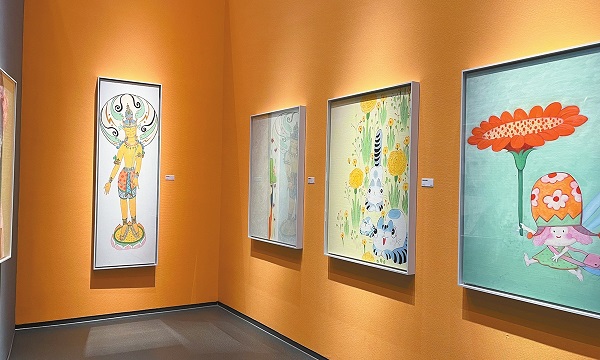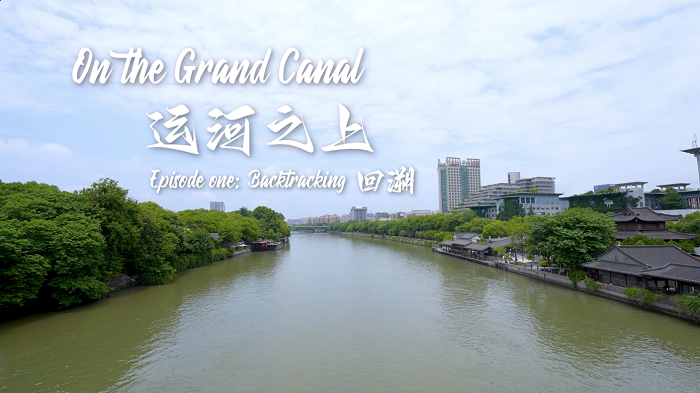Nourished by Taoist classics, Taiwan comic artist archives masterpieces in Chinese mainland

Artworks of Tsai Chih-chung Photo: Courtesy of Tsai Chih-chung
"If a kind of philosophy or a piece of literature can be passed down and inspire generations for thousands of years, this philosophy must contain universal value that can nourish people worldwide, just like Chinese philosophies of Taoism, Confucianism and Zen Buddhism," Tsai Chih-chung told the Global Times.
Tsai Chih-chung, born on the island of Taiwan, and spends much of his time in the Chinese mainland, is one of the world's artists with the most best-selling comics. Throughout his lengthy career, he has focused on uncovering the universal values he glimpsed in Chinese philosophy and literature, striving to make them accessible and popular by using plain language and engaging illustrations.
Tsai finally carved out his own literary niche. Nourished by these classics, his comic books have been translated into more than 20 languages and gone on sale in over 50 countries around the world.
The artist's ties with the Chinese mainland grows closer as time goes by. Residing in Hangzhou, East China's Zhejiang Province after becoming addicted to the "cultural atmosphere of the city," Tsai's personal gallery, which houses most of his lifelong manuscripts and masterpieces, opened in May in Gaoping, North China's Shanxi Province, a region historically associated with the ancient deified ruler Shennong, the Yan Emperor, the ancestor of Chinese civilization.
Like Tsai, other cultural luminaries, including Jiang Xun, in Taiwan feel bound to the essence of Chinese civilization and shared cultural roots across the Taiwan Straits, with their own creations and promoted the Chinese cultural essence to a larger number of audiences through comics and other art forms.
'Easy to understand'
Structured around uniform two-page spreads, each left-hand page features a full-height caption box displaying the original Chinese text of the Taoist philosopher Zhuangzi during the Warring States Period (475BC-221BC), which was mirrored by the same format on the right-hand page.
The delicate black lines of the drawings, the English text, the frames, and the ideographs come together in harmonious compositions that align beautifully with the themes of Zhuangzi's writings. The sage advice "Don't draw a boundary around the boundless" is enriched by this visual paradox. Additionally, Tsai established a visual rhythm by placing Zhuangzi's moral-like statements in the unframed white space of a concluding panel, emphasizing their significance.
This is the English version of one of Tsai's comic books, adapted from Zhuangzi's The Way of Nature, an ancient Taoist text. The image of Zhuangzi in the book features a mostly bald head roughly a third the size of his body, amusing readers with characters' exaggerated movements while adding humorous elements in the philosophical literature that is usually considered as abstruse.
Among his more than 200 titles, Tsai turns the ancient Chinese philosophers such as Zhuangzi, Laozi and Confucius into humorous images through his comics and simplifies the interpretations of their thoughts through many interesting stories, lowering the threshold for non-professionals to get access to the sage theories.
"I convey these traditional philosophical ideas to the world through the medium of comics as one of the mediums' advantages is that comics are easy to understand," Tsai told the Global Times. "You need to remember what your readers' demands are all the time."
Born in Changhua county on the island of Taiwan in 1948, Tsai taught himself the art of animation and founded the animation studio. The first full-length animated movie was produced by the studio in 1981.
Then Tsai developed a plan to adapt the major Chinese classics into comic book formats. The first was Zhuangzi Speaks, which immediately shot up the best-sellers list and stayed at the No. 1 spot for 10 months. Tsai's classic series took off since then.
Although Tsai has had excursion into so many sage thoughts in Chinese history, in his eyes, he has special bond with Taoism, the original philosophy created in China. His spiritual idol is Laozi, creator of Taoism, and he thought himself performs deeds as Zhuangzi, who maintained unconstrained mind and life.
Despite having sold over 60 million copies of his books around the world, Tsai has not slowed down in his creative endeavors.
Though settled in Hangzhou, Tsai has also moved his creations to the art gallery in Gaoping, bringing them closer to the source of his inspiration.
New window for exchanges
One important reason why Tsai chose Shanxi Province, one of the origins of Chinese civilization peppered with various relics and a long heritage, is because the Shanxi Province's rich historical atmosphere aligns perfectly with his works. He believes that the essence of Chinese civilization, deeply rooted in the city, offers abundant material and inspiration for his artistic creations.
Since its opening in May, coinciding with the person-to-person cross-Straits cultural activities honoring the Yan Emperor held in Gaoping, the gallery has welcomed over a thousand tourists per day on average to appreciate the artist's works.
The gallery has been recognized as a new platform for cross-Straits cultural exchanges, in addition to being a venue for appreciating and studying artworks, according to the director of the city's culture and tourism bureau.
These exchanges through artworks have spanned different generations of artists.
Veteran artists in Taiwan brought their exllcellent crafts to share with many young people through various audio and video programs, while cross-Straits younger artists are exchanging their ideas in art exhibitions held in diverse places on both sides of the Taiwan Straits.
-
Hit Chinese video game builds pride, subdues prejudice
August 27, 2024
-
'Black Myth: Wukong' breaking stone: Journey matters more than reaching summit
August 21, 2024
-
Electricity illuminates city's night economy in Hangzhou
August 14, 2024



